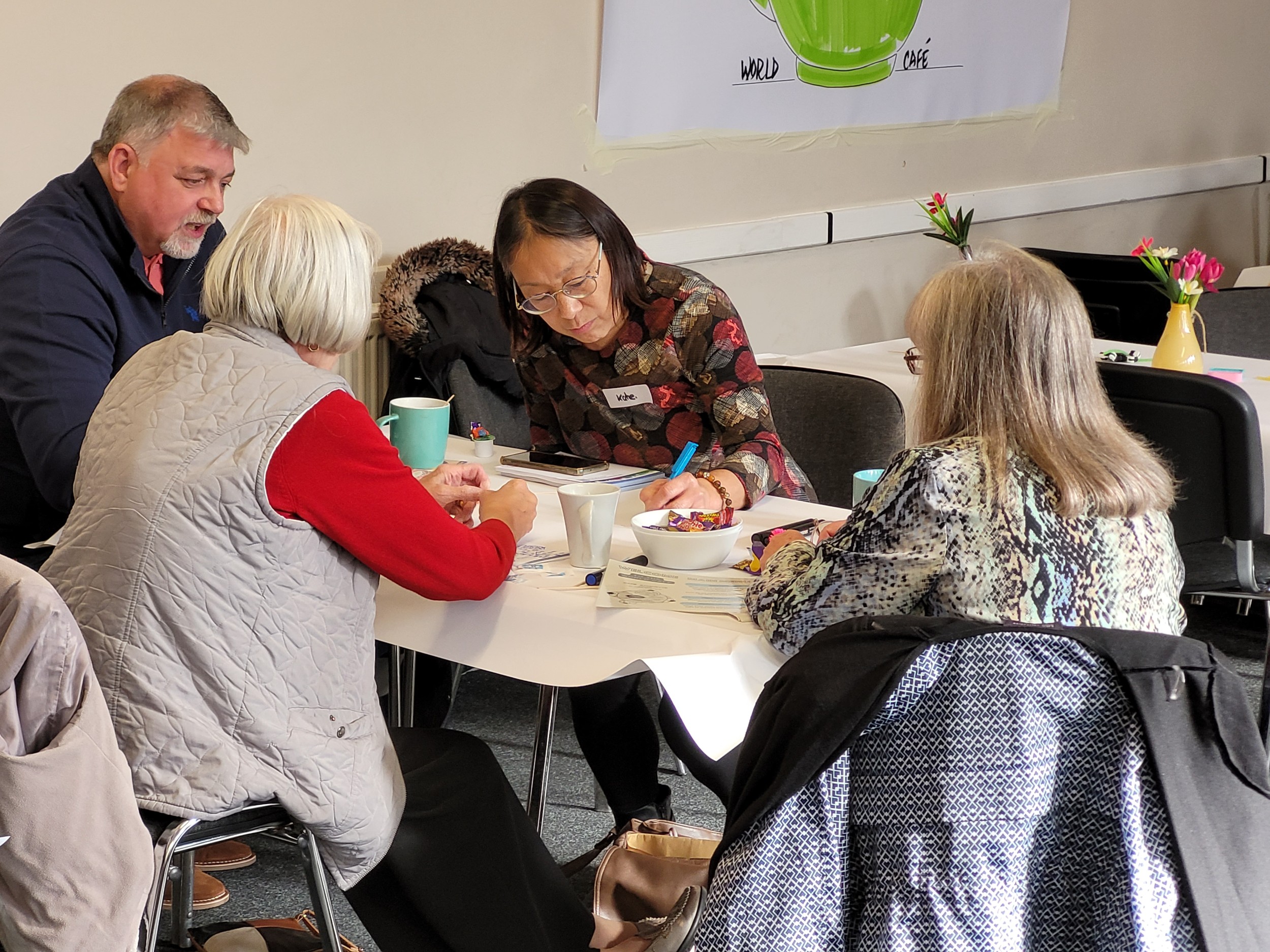Both Sandwell and Wolverhampton have set up local anchor institutions networks while networks in Walsall and Dudley are currently in development.
The Black Country wide Anchor Institutions Network was created in April 2022 and is formed by representatives from:
- NHS Black Country Integrated Care Board
- CLES (the national organisation for local economies)
- The Wolverhampton Pound
- Wolverhampton City Council
- Sandwell Anchor Institutions Network
- Sandwell Council (Regeneration Manager)
- Sandwell Council (Anchor Network Coordinator)
- Walsall Together
- Walsall Council
- Dudley Council
- whg
- Economic Intelligence Unit
- Bromford
- Black Country Healthcare NHS Foundation Trust
- NHS Dudley Health and Care Partnership
- City of Wolverhampton College
With plans to expand the network to include other public organisations. There is initial interest in joining the network from Environment Agency, West Midlands Fire Service, Network Rail, E-On and Green Square Accord.
The Network will support major Black Country-wide and West Midlands-wide employers to deliver positive economic, health, social, and environmental outcomes locally. Critically, this will amplify the work of, and underpin the success of, individual local authority anchor networks.
Key partners
During the year we have been looking at several areas we would like the network to take forward including:
Social value / procurement
- Supporting the development of new procurement and supply chain policies and practice to source goods and services locally.
- Identifying key regeneration projects across the Black Country & potential opportunities to build community wealth building within them.
- Upscaling successful local authority ventures, and working with organisations such as Business in the Community.
- Harnessing opportunities of social investment and social finance.
- Supporting a shift in behaviours away from social value procurement being a tickbox, to system / institution-wide cultures.
Net zero
- Developing a more cohesive approach to retrofit and piloting approaches for greater deployment.
- Encouraging carbon literacy and integration with wider streams of work such as circular economy principles and industrial symbiosis programmes: ways for organisations to reduce carbon emissions and energy costs.
- Utilising anchor network spend to drive green behaviours across the economy, including through green financing.
Employment / skills
- Working with employment and skills teams alongside the Voluntary sector to source local employment opportunities for Black Country residents, with a long-term approach to individual progression.
- Employment and apprenticeship sharing schemes across organisations
- Looking into and improving pay and conditions.
- Implementing workplace wellbeing initiatives.
- Highlighting the importance and business case of effective equality, diversity and inclusion
- Harnessing sector skills work to drive inclusive outcomes in tandem with fulfilling industry needs.
Health inequalities
- Commissioning work to understand the importance of economic growth on health outcomes in the Black Country.
- Identifying opportunities through current and future health commissioning to address unequal healthcare outcomes across the Black Country and inform best practice and learning.
- Supporting the NHS to develop its anchor priorities and support coordination efforts across all places to ensure unwarranted variation is highlighted and addressed as well as ensuring learning is shared across the Black Country.
Although all of these priorities are being taken forward by organisations across the Black Country, the work of the network is to consider what we can do to share learning and or coordinate these activities across the black country where it is feasible to do.
The RLW is a movement lead by the Living Wage Foundation to try and put more money into the pockets of low paid workers and is a UK wage rate based on living costs.
- The minimum wage
- Government minimum for under 21s is £8.60 across UK
- Is it the law? Statutory
- What age group is covered? School leaving age up to 21
- How is it set? Negotiated settlement based on recommendations from businesses and trade unions
- Is there a London weighting? No London Weighting
- The national living wage
- Government minimum for 21 year olds and over and is £11.44 across UK
- Is it the law? Statutory
- What age group is covered? 21 and older
- How is it set? A % of median earnings
- Is there a London weighting? No London Weighting
- The real living wage
- The only wage rate based on what people need to live is £12.60 across UK and £13.85 in London.
- Is it the law? Voluntary
- What age group is covered? 18 and older
- How is it set? Calculation made according to the cost of living, based on a basket of household goods and services
- Is the a London weighting? Yes - Separate higher rate for London
Low pay is a national problem with one in six UK employees earning below the Real Living Wage (RLW). Low pay is also a gender issue with nearly one in five women in work earning below the RLW and similarly a race issue, with 16% of white employees earning below the RLW compared with 19% of employees from ethnic minority communities. Against the backdrop of inflation increasing and rises in cost of living, the squeeze on low income employees is intensifying.
The Black Country Anchor Institutions Network (BCAIN) established in March 2022 is focusing on employment and employability as one of the key priorities and workstreams, in turn supporting the NHS around broader social and economic development. This includes encouraging and supporting those anchor institutions who are part of BCAIN to become RLW accredited employers. Below highlights the BCAIN anchors that currently pay the RLW and those that are RLW accredited.
| Organisation | Real Living Wage Status |
|---|---|
| West Midlands Police | LWF Accredited |
| West Midlands Fire Service | LWF Accredited |
| Sandwell and West Birmingham Hospitals NHS Trust | LWF Accredited |
| Walsall Healthcare NHS Trust | LWF Accredited |
| West Midlands Combined Authority | LWF Accredited |
| Environmental Agency | LWF Accredited |
| University of Wolverhampton | LWF Accredited |
| The Royal Wolverhampton NHS Trust | Real Living Wage introduced but not LWF Accredited |
| Black Country Healthcare NHS Foundation Trust | Real Living Wage introduced but not LWF Accredited |
| Dudley Metropolitan Borough Council | According to the website, the Council is a Real Living Wage employer (since 2019). Not LWF Accredited. |
| Sandwell Metropolitan Borough Council | According to the website, the Council is a Real Living Wage employer (since 2017). Not LWF Accredited. |
| Walsall Metropolitan Borough Council | According to the website, the Council is a Real Living Wage employer (since 2015) but some apprentices and informal roles are paid below RLW. Not LWF Accredited. |
| City of Wolverhampton Council | According to the website, the Council is a Real Living Wage employer (since 2019). Not LWF Accredited. |
The Black Country ICB is committed to providing adequate wages for our employees, which is why we are working hard to gain Real Living Wage accreditation and encouraging our partners, who are not accredited, to do the same.
Social value is a term used to describe the positive improvement an organisation delivers to society. When we think about social value we have to think about the impact we are driving.
The Shaw Trust provides a simple understanding of Social Value… “Social Value is about the wellbeing of current and future generations and covers three different areas – Social, Economic and Environmental”
For the NHS this means we need to consider how our assets and resources can be used to provide greater benefit to our local citizens, communities and the environment within the goods and services we procure and commission.
There are many things that are important and valuable to people and these will be different for each person, some examples might be…
- Sustainable transport
- Use of green suppliers
- Electronic rather than paper systems
- Support to increase earnings or access benefits
- New employment opportunities generated
- People prevented from becoming homeless
- Hospital admissions avoided
- Police incidents avoided
- Develop skills and confidence
- Increased safety
- Overcoming social isolation
- New relationships established
And many, many more.
Social value also has clear connections with efforts to reduce health inequalities. Actions on social value can help to act on the social determinants of health – the conditions in which we are born, grow, live, work and age.
Social value projects
To begin to progress and embed Social Value throughout the Black Country ICB the Transformation and Partnerships directorate will be developing a Social Value Framework and policy.
We will also be delivering Social Value workshops to ICB colleagues to develop internal capability and knowledge amongst procurement and contracting, commissioning and primary care functions. Social Value will be included as part of a new training programme for Health Inequalities Champions launching in Autumn 2024.
The ICB are also looking to operationalise Social Value as part of all contracts and procurements aligning this to the organisation’s Population Outcomes Framework. This will help ensure our procurements deliver what our population wants. Increased measuring and monitoring of social value as part of awarded contracts will be explored.
BCAIN will facilitate wider development to embed social value across the ICS in goods and services to encourage more local and sustainable options and ways of keeping the Black Country pound within the Black Country.
The NHS is committed to reducing its carbon emissions nationally with the target of...
- The NHS Carbon Footprint: for the emissions we control directly, net zero by 2040
- The NHS Carbon Footprint Plus: for the emissions we can influence, net zero by 2045.
You can find out more about the Black Country ICS’s Greener Black Country initiatives here.
Our local NHS Trusts are all working hard to reduce carbon admissions and moving towards net zero by 2040, you can find out more on how they plan to do this here:
- The Royal Wolverhampton NHS Trust – Green Plan 2020-25
- The Dudley Group NHS Foundation Trust – Green Plan 2020-25
- Sandwell & West Birmingham NHS Trust - Green Plan will help to cut 1m tonnes of C02 emissions | Sandwell and West Birmingham NHS Trust (swbh.nhs.uk)
- Walsall Healthcare NHS Trust – Green Plan 2021-26
What is Retrofit?
Reducing the energy used within an existing building by using new technology, materials or products is known as Retrofit, it helps to save energy costs on homes and buildings as well as fighting climate change. We know that being in cold and damp homes and buildings can cause health conditions and make existing health problems worse.
The Black Country Anchor Institutions Network is working with training providers, local businesses, supply and demand chains and West Midlands Combined Authority to increase the energy efficiency in more homes and buildings across the Black Country.
Maximise Good Local Employment:
- As an employer the Black Country ICB will support the health and wellbeing of our staff and ensure we are paying the national living wage to all staff.
- Tackle unemployment challenges by filling skills gaps and encourage careers in health.
- Prioritise jobs for local people – currently 62% of NHS staff live and work in the Black Country, 38% live outside.
- Offer open and accessible recruitment processes ensuring our communities understand how we recruit and the opportunities we have as employers.
- Work with System partners to develop new apprenticeship/intern models across organisations and sectors.
Within the Black Country we have four places (Dudley, Walsall, Wolverhampton and Sandwell) who are all at varying stages of existing or new employment projects. Therefore, our plan within the Black Country is to have oversight of the projects bringing the four project teams together to provide a space to share good practice with each other across the Places and ensure consistency in monitoring and measuring the value of the initiatives. With the four places running their own local employment programmes based on their local requirements, resources and partnership arrangements.
Several of our place-based employment initiatives are based around the ‘I CAN’ model, an employment programme ran by Birmingham and Solihull ICS which aims to reduce health inequalities whilst addressing the workforce challenges around recruitment and retention faced by the five local NHS Trusts. It does this by supporting unemployed and young people in the area into NHS entry level jobs providing gainful employment and opportunities.
Dudley
With support from Commonwealth Games Legacy Funds Dudley established ‘Dudley I Can’ in May 2023, which focuses on as the boroughs two largest employers both NHS and Council jobs. Both the NHS and the Council are working collaboratively and have recruited coordinators for their programme, Dudley Council are taking the lead on outreach and training provision with the long-term goal to eventually expand it to different sectors across Dudley. In the short-term, NHS are providing entry routes into Clinical Support Worker posts and the Council entry routes into Care and Business Administration roles, they are also testing how paid work placements can provide pathways into work for local residents from underrepresented groups. As anchor institutions in the Dudley, they are seeking to create the conditions for culture change, authentic partnerships, and systemic learning to enable us grow and keep our workforce within the borough.
Careers in council and health and care through "I Can - Dudley"
- Employability
- Functional Skills support
- Sector based Work Programmes
- Pre employment pathways and support
- Recruitment & Retention
- Managing expectations / pre-conceptions
- Right roles and pathways for individuals
- Development support and training
- Anchor Institution
- Advocate for health, social and employment inequalities
- Community partnerships and supporting local employers
- Developing inclusive workplace culture
- Accessible recruitment
- Increase understanding of NHS roles and Dudley Council
- Identify local employment needs
- Change and improve recruitment processes
- Barriers
- Efficient recruitment pathways with support
- Building knowledge of lived in experiences
- Listening and understanding our local community
- Career change
- Support career aspirations
- Increase awareness of Careers at Dudley Council and at the NHS
- Partnership working with local employers
Walsall
In Walsall, a partnership led by whg and working collaboratively with Walsall College, the Department of Work and Pensions (DWP) and Walsall Healthcare NHS Trust was developed in 2020, through a programme called Work 4Health. whg are a place-based community housing association dedicated to the success of our people and places and we work strategically with health and social care using our role as Board Members of Walsall Together to improve outcomes for our customers and the wider communities that have high numbers of people out of work.
whg began the Work4Health programme over 4 years ago recognising that good work is the cornerstone of good health and a good life. We were aware that health and social care were struggling to fill vacancies and that we had customers who were long term unemployed and could be real assets to the NHS workforce.
In recognition that our customers were not successfully navigating the normal NHS recruitment process whg worked closely with Walsall Healthcare NHS Trust’s in house recruitment team, Walsall College and the DWP to co-design the programme that handheld our customers providing a human bridge of support between them and the vacancies.
The Work4Health programme targets entry level NHS jobs at local people new to working within the healthcare sector and consists of a three-week sector specific programme that includes accredited skills training, sector knowledge and a guaranteed job interview on successful completion of the programme.
Key outcomes include the workforce representing the diverse community it serves.
To date over 50% of successful applicants are from a diverse background and 82% were previously long term unemployed.
Working as a partnership the Work4Health programme have placed 163 residents into sustainable work within the NHS. The programme goes from strength to strength changing the lives of the individuals, building stronger communities, and demonstrating the role anchor organisations play in connecting local people to local jobs by raising awareness of key vacancies and providing them with tailored upskilling training and support.
The team are currently looking at extending the reach of this programme by providing job opportunities in Adult Social Care.
For more information see whg recruitment programme helps 150th customer join the NHS - whg Housing Association.
Sandwell
Sandwell and West Birmingham NHS Trust (SWB) has been running a range of employability programmes over the past 12 months to support local people into employment, we have embedded a range of programmes which aim to break down barriers and provide more inclusive and supportive routes into employment.
Working in partnership with Sandwell College, Department for Work and Pensions (DWP), Sandwell Metropolitan Borough Council (SMBC), St Basils and other referral partners we have delivered a range of Sector Work Based Academy Programmes (SWAPs), Gateway Programmes and bespoke employability programmes which has resulted in 127 people being offered permanent, substantive roles at SWB and a further 27 people being offered jobs with other local employers. In addition, the Widening Participation Team also work on a range of bespoke projects including:
- Live & Work - working in conjunction with St Basils to support young people at risk of homelessness, supporting with apprenticeships and work opportunities together with accommodation on Sandwell Hospital site.
- Healthcare Overseas Professionals (HOP) - supporting local overseas qualified refugees to navigate the NHS system, providing opportunities for work experience/clinical attachments, employability and language skills.
- DFN Project Search - supporting young people with a learning disability and/or autism with a 12-month supported internship. Working in partnership with SMBC and Westminster Specialist College. Home - DFN Project Search
For more information please visit The Learning Works | Sandwell and West Birmingham NHS Trust (swbh.nhs.uk).
Wolverhampton
The Royal Wolverhampton NHS Trust (RWT) currently run a recruitment scheme in partnership with the Prince’s Trust within the NHS Futures services at RWT. You can read about the scheme on the NHS Employers website.
The team also work in partnership with, Wolverhampton College and DWP to offer additional programmes with no age limit but marketed at those over 30. Last year 2023/2024 over 50 people moved into employment through the current programmes.
More information can be found on the RWT website.
Black Country Healthcare NHS Foundation Trust
The Thrive into Work service was setup as a randomised control trial in 2018 and following its success it was rolled out to eligible clients across the West Midlands and will continue until at least 2025 and hopefully longer.
As of April 2023 Black Country Healthcare NHS Foundation Trust (BCHFT) offer two programmes under Thrive into Work:
1. Thrive into Work Neurodiversity Service (West Midlands wide)
2. Thrive into Work Dudley and Walsall
More information about the Thrive into Work programme, and the other Employment and Recovery programmes on offer through BCHFT, with eligibility criteria and how to apply can be found on the BCHFT website
There is also more information on the Black Country ICS website.
BCHFT support people to not only find paid employment, but they also support people to retain a job they are currently in and at risk of losing-they might still be at work or on a period of sick leave. These include employment services across the West Midlands but predominantly in Dudley, Walsall, Sandwell and Wolverhampton. You can find out more about what they do on the BCHFT website here.
WorkWell

WorkWell is a new initiative set to support thousands of people across the Black Country with health conditions and disabilities to find or retain employment to boost their wellbeing.
The Black Country is one of just 15 places around the country chosen as a pilot area to deliver the WorkWell scheme which will provide early intervention to people who are experiencing barriers to gain or retain employment due to health conditions or disabilities.
It will be led by Black Country Healthcare NHS Foundation Trust (BCHFT) but will draw on the expertise of partner organisations to provide knowledge and shared learning to develop the service, as well as opportunities to provide holistic support to participants.
More information on eligibility into the service, as well as how to refer including self-referral, can be found on the WorkWell service webpage.
For more information on the Black Country Anchor Institutions Network, please email the Transformation and Inclusion team at bcicb.transformation@nhs.net.




